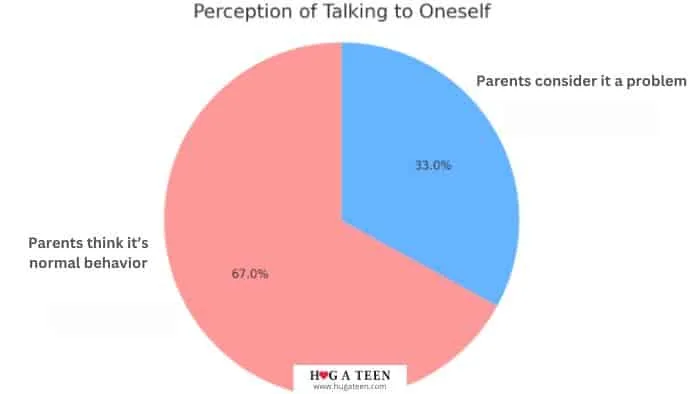I’ve recently noticed several discussion where parents wondered if it’s normal for children to talk to themselves.
Have you encountered your teen chattin’ away to themselves as if there was someone else in the room?
Well, fear not, because this peculiar habit is actually quite common and serves an essential purpose in their development.
- Why do kids talk to themselves?
- Is It Normal For Your Child To Talk To Themselves?
- How To Respond to Kids Talking to Themselves
- At What Age Do Children Usually Stop Talking To Themselves?
- When Should You Be Concerned About Self-Talk?
- Do Parents Consider Self-Talk Normal - Poll Results
- Does Everyone Experience Inner Speech?
- Do People With Inner Speech Talk To Themselves More Often?
- Final Thoughts on Self-Talk In Children
Why do kids talk to themselves?
Firstly, it’s essential to understand that self-talk is not a sign of a mental health condition. In fact, it can be quite the opposite!
Children talking to themselves is a natural and healthy part of their cognitive growth. It allows them to explore their thoughts and emotions, practice language skills, and even problem-solve.
Talking to oneself, often referred to as self-talk, is a common behavior among teenagers and is generally considered normal.

Here are some key points regarding this behavior:
1. Developmental Aspect
During adolescence, teens undergo significant cognitive and emotional development. Talking to themselves can be a way to process emotions, organize thoughts, and work through complex ideas.
It allows them to develop a sense of self and identity by exploring their feelings, opinions, and desires.
2. Problem-Solving Tool
Teens may use self-talk as a strategy for problem-solving. Articulating thoughts and ideas out loud can help in better understanding and organizing them.
By vocalizing their inner reasoning, they can test hypotheses, consider alternatives, and come up with solutions to various problems.
This self-narration is like their own mental whiteboard, aiding them in finding the best path forward.
3. Emotional Regulation
Self-talk can also serve as a means of emotional regulation. It allows teens to express and manage their feelings, especially in situations where they might not feel comfortable sharing these thoughts with others.
When facing challenging tasks or emotions, talking to themselves can provide comfort and guidance, acting as their own personal cheerleader or coach.
By talking through the steps they need to take or expressing their emotions, children gain a sense of control and confidence, which helps them tackle various situations more effectively.
Adults often use positive self-talk to motivate themselves or to boost self-esteem.
4. Creativity and Learning
Engaging in self-dialogue can boost creativity and enhance learning. It can be particularly helpful in tasks that require planning or creative thinking.
By repeating information aloud, they create a stronger connection in their memory, reinforcing what they’ve just learned.
5. Promotes Empathy
Self-talk promotes empathy, as children may imagine the perspective of another person and engage in imaginary conversations with them.
Through this, they learn to relate to others and develop vital social skills.
6. Normal vs. Concerning Behavior
While self-talk is generally normal, it’s important to differentiate between healthy self-dialogue and potential signs of mental health concerns.
If the self-talk is negative, distressing, or accompanied by other worrying symptoms (like withdrawal from social activities, or changes in mood or behavior), it might be a sign to seek professional advice.
Persistent negative self-talk can be a sign of something more serious.
7. Cultural and Individual Differences
Cultural background and individual personality can influence how and when teens engage in self-talk. In some cultures, verbalizing thoughts is more common and socially accepted.
8. Technological Influence
With the rise of technology, especially smartphones and voice-assisted devices, talking out loud, even when alone, has become more normalized.
So, the next time you see your child engrossed in a self-conversation, embrace and encourage this behavior. Remember that it’s a normal and beneficial part of their growth.
By understanding why kids talk to themselves, you can appreciate the cognitive, emotional, and social advantages it offers – making those seemingly quiet conversations all the more meaningful.
Is It Normal For Your Child To Talk To Themselves?

As parents, we often observe our children engaging in various behaviors that might leave us questioning their sanity. One such behavior is when a child talks to themselves.
In our poll, some parents questioned whether having an imaginary companion is a sign of schizophrenia or hallucinations, or if the child just has a vivid imagination.
It is not uncommon for kids to be caught in deep conversations with an imaginary friend, or even having debates or monologues while alone in their room. But is this behavior normal, or should we be concerned?
The short answer is that talking to oneself is a rather common behavior among children and is generally considered a natural part of their development.
Children often engage in self-talk as a means to process their thoughts, express their emotions, and solve problems.
It allows them to practice communication skills, experiment with different social scenarios, and develop their cognitive abilities. For some children, talking to themselves serves as a way to reinforce memory, focus attention, or organize their thoughts.
While it is true that excessive self-talk or prolonged engagement in imaginary worlds could be a sign of certain developmental issues, it is important to distinguish between normal behavior and potential concerns. The key here is to look for an overall pattern of healthy human development and social functioning.
Experts advise that parents should consider the frequency, intensity, and impact of self-talk when determining its normalcy. Occasional self-conversations that are not disruptive or interfering with the child’s daily activities or social interactions are usually indicators of normal behavior.
It is perfectly normal for children to create imaginary friends, have conversations with objects or animals, or narrate their play, especially when younger.
However, if self-talk becomes obsessive, repetitive, or interferes with the child’s ability to concentrate, communicate, or engage in social interactions, then it may be beneficial to consult a healthcare professional.
Additionally, if self-talk is accompanied by other red flags, such as extreme mood swings, signs of anxiety, difficulties in other areas of development, or after a traumatic event, it is advisable to seek professional guidance.
As parents, it is important not to overly worry about self-talk, as long as it remains within the boundaries of normal behavior.
Interacting with them, asking questions about their conversations, and showing interest in their imaginary worlds can provide valuable insights into their thought processes and offer opportunities for bonding.
🤓 Suggested reading: At What Age Did Your Teen’s Behavior Start Changing?
How To Respond to Kids Talking to Themselves
How should parents respond when they encounter their kids babbling away to no one in particular?
It is important to remember that these conversations are a natural part of a child’s language development. Avoid making them feel self-conscious or embarrassed about talking to themselves.
Instead, try to create an open and accepting environment where they feel comfortable expressing their thoughts.
If you notice your child participating in these conversations excessively or uncontrollably, you can gently redirect their attention to a more appropriate activity. Encourage them to engage in an interactive game, read a book aloud, or join you in a conversation. This redirection helps them strike a balance between personal self-talk and social interaction.
It is also crucial to keep an eye out for any signs of distress or unusual behavior during these self-conversations. If the child appears anxious or expresses worrying thoughts, it may be an indicator of an underlying issue. In such cases, it is advisable to have a conversation with them or seek professional advice if necessary.
In summary, talking out loud to oneself is a normal behavior for teens, often serving as a tool for thought organization, emotional expression, and problem-solving. However, it’s important to be aware of the context and nature of the self-talk to ensure it remains a healthy behavior.

Here’s an example script you can use if you overhear your teen talking to themselves in their room:
Setting: A family home. The teenage daughter, Emma, is in her room, seemingly engaged in a conversation with someone, although she’s alone. The mother walks by the room and hears Emma’s animated talking.
Emma: (Inside the room, unaware of being overheard) “No, I totally get what you’re saying. Yeah, I think that’s a great idea!”
Mom: (Knocks softly and opens the door a bit) Emma, can I come in for a second?
Emma: (Startled, quickly covers her phone) Oh, uh, sure Mom.
Mom: (Enters and sits on the edge of the bed, speaks gently) I heard you chatting away in here. Who were you talking to?
Emma: (Nervously) Oh, no one. I was thinking through some stuff.
Mom: That’s cool. Sometimes talking things out, even with ourselves, can help clear our minds. Is everything okay?
Emma: Yeah, it’s fine. I just do that sometimes, you know, talk through things out loud.
Mom: I understand. It’s a good way to process your thoughts. But is there anything on your mind you’d like to talk about with me?
Emma: It’s just school stuff… and friends. Sometimes I find it easier to just talk it out like they’re here, you know?
Mom: Absolutely, it’s a very normal thing to do. But remember, if there’s ever anything you want to talk about or get another perspective on, I’m here. It’s okay to share your thoughts with me too.
Emma: I know. Thanks. It’s just easier sometimes to figure things out on my own first.
Mom: Of course, and that’s perfectly fine. Just know that you’re not alone, and it’s okay to ask for help or just chat about things whenever you need to.
Emma: Thanks, Mom. Maybe another time.
Mom: Whenever you’re ready, no pressure. And hey, if you ever feel like your self-conversations are getting overwhelming or troubling, it’s important to talk about that too, okay?
Emma: I will. Thanks for understanding and not making it weird.
Mom: Always. You’re growing up and figuring things out, and that’s a big deal. I’m proud of you for finding ways to work through your thoughts. Now, how about we grab some dinner together?
Emma: Sounds good.
Although this is an example of a perfect scenario, and we know that not all teens will react in the same way, this shows how a parent can respond with understanding and openness if their teen is engaging in a self-conversation.
By normalizing the behavior while also offering a listening ear and support, parents can promote a healthy and non-judgmental environment for open communication.
🤓 Suggested reading: Effective Parenting Communication Techniques
At What Age Do Children Usually Stop Talking To Themselves?
Children typically begin to internalize their self-talk during the early elementary school years, but the exact age at which they stop talking out loud to themselves can vary greatly among individuals. Here’s a general timeline:
- Early Childhood (Ages 2-6): During these years, children frequently engage in self-directed speech, commonly known as private speech. This is part of normal development and is often observed during play or when they are trying to solve problems. This is also the time when they might have an imaginary friend.
- Elementary School Years (Ages 6-10): As children enter school and their social and cognitive abilities develop, they start to internalize their self-talk. This means they are still engaging in self-dialogue, but it becomes more silent or internal rather than out loud. However, it’s not unusual for children to continue to talk to themselves out loud occasionally, especially when concentrating or under stress.
- Adolescence and Beyond: While overt self-talk decreases with age, it doesn’t completely disappear. Many adolescents and adults still talk to themselves out loud in certain situations, such as when working through a difficult task or problem, experiencing strong emotions, or needing to remember something important.
It’s important to remember that the transition from external to internal self-talk is gradual and varies from child to child.
Some children may internalize their self-talk earlier, while others may continue to engage in out-loud self-dialogue for longer.
Additionally, talking to oneself, whether internally or externally, remains a normal cognitive process throughout life.
When Should You Be Concerned About Self-Talk?
While talking to themselves is generally a normal part of development for children, there are certain scenarios where it might be a cause for concern.
Parents should consider seeking advice or evaluation from a healthcare professional if they notice the following signs in conjunction with their child’s self-talk:
- Age-Inappropriate Behavior: If a child continues to frequently engage in out-loud self-talk beyond the age where it’s typically internalized (usually by around age 7 or 8), especially if it seems to interfere with their social interactions or daily activities, it may warrant further evaluation.
- Negative or Distressing Content: If the self-talk is consistently negative, distressing, or involves harmful themes, it could be a sign of underlying emotional or psychological issues that need to be addressed.
- Social Withdrawal: If the child seems to prefer talking to themselves over interacting with others, or if self-talk is accompanied by a noticeable withdrawal from social situations and relationships, it could indicate social development issues.
- Impact on Daily Functioning: If the self-talk is so frequent or intense that it interferes with the child’s ability to concentrate, participate in school, or carry out daily activities, this could be a sign of concern.
- Hallucinatory Nature: If the self-talk appears to be directed towards or responding to unseen entities, or if it seems like the child is having a conversation with someone who isn’t there, this could indicate hallucinations, which could require professional attention. However, it’s important to note that articulating thoughts out loud while problem-solving could sound like your child is having a discussion with someone, and this is normal self-talk.
- Accompanied by Other Behavioral or Developmental Issues: If the self-talk is part of a broader pattern of unusual behavior, developmental delays, or learning difficulties, it’s important to seek a professional assessment.
- Changes in Mood or Behavior: If there is a sudden onset or a significant change in the nature of the self-talk, especially if accompanied by changes in mood, sleep patterns, or appetite, it could be indicative of underlying mental health concerns.
It’s important for parents to approach these concerns with sensitivity and without judgment.
Fiona C. commented:
“There are many people around the world who hear voices, and schizophrenia itself isn’t a bad thing. If the voices become out of control to the point where someone is unable to function, scared or overwhelmed, that’s when they become a problem. It’s best to let your child feel that it’s okay to self-speak and that many other people do this too. If you make them feel embarrassed they will hide it from you. Make sure they know it’s okay to talk to you about it. In my opinion, shame and fear are what cause real damage.”
Many children engage in some form of self-talk as a normal part of their development, and the presence of self-talk alone is usually not a reason for alarm.
However, when it’s coupled with other concerning signs as mentioned above, a consultation with a pediatrician, psychologist, or child psychiatrist may be beneficial to ensure the child’s overall well-being and development.
Do Parents Consider Self-Talk Normal – Poll Results
We posted a poll on our Facebook Group and asked parents whether or not they considered the behavior of talking to oneself to be normal or whether it might be indicative of a problem.

Here’s the breakdown:
Viewpoint: Behavior is Normal
A significant number of respondents expressed that talking to oneself is normal behavior. They shared personal experiences or observations of their children engaging in self-talk without any underlying mental health issues. Many mentioned that they, too, talk to themselves and view it as a harmless or even beneficial practice.
My 13-year-old daughter does this. She is a child on the spectrum who is extremely high-functioning. It all comes down to social-emotional needs. She does not have a lot of friends, so I feel like she role-plays having friends when she’s alone.
Jane T.
Another mom commented that her daughter role-plays:
“Many kids pretend to be influencers. One of my friends’ girls will chat away in her room as if she’s doing unboxing videos or makeup tutorials.”
Jackie P.
Viewpoint: Behavior Might Indicate a Problem
A smaller, yet notable, group of respondents suggested that the behavior could be a sign of an underlying issue. Concerns ranged from mental health conditions like schizophrenia to the possibility of the child secretly using a phone or being involved in activities unknown to the parent. Some recommended seeking a professional evaluation or monitoring the behavior for any signs of distress or dysfunction.
“The best thing to do is take her to the doctor. Ask her pediatrician for a recommendation or chat to a child psychologist.”
Allison F.
From the comments, it appears that the majority lean towards considering self-talk as a normal, non-problematic behavior, often citing personal experiences or observations to support this view.
However, there is still a significant voice of caution advising to monitor the behavior for any potential signs of concern.
Based on the comments from our Facebook poll:
- Approximately 67% of respondents view talking to oneself from time to time as a normal, non-problematic behavior.
- About 33% suggest that the behavior might indicate a problem or recommend seeking a professional evaluation.
Does Everyone Experience Inner Speech?
According to several studies, the concept of inner speech and the percentage of people who experience it varies.
In one study, about 26% of a random sample of 30 people talked to themselves inwardly.
This study suggests that inner monologue is frequent for 30 to 50 percent of people, with significant individual differences – some people never experience inner speech, while others have it nearly all the time.
One mom commented:
Apparently, about 60% of us don’t hear a voice in our heads, while the other 40% do and talk to ourselves. I was shocked when I heard this as I thought everyone had a running commentary in their head.
Janet K.
Another parent noted:
“Children with certain behavioral issues, such as attention deficit hyperactivity disorder, tend to talk to themselves more than their peers.”
Todd M.
It’s important to note that these findings indicate that there is a wide range of experiences regarding inner speech. Some individuals may frequently engage in inner dialogues, while others might not experience this at all. This variability highlights the diversity in cognitive experiences among individuals.
Do People With Inner Speech Talk To Themselves More Often?
Yes, people with inner speech are more likely to talk to themselves than those who do not experience inner speech.
Inner speech, or the internal monologue, refers to the silent verbal thoughts that individuals have in their minds. It’s a form of self-communication that plays a crucial role in thinking, planning, self-reflection, and problem-solving.
- Frequency of Self-Talk: Those who experience inner speech regularly are more accustomed to this form of self-dialogue. Therefore, they may be more inclined to externalize this internal conversation, leading to talking to themselves out loud more frequently.
- Nature of Inner Speech: Inner speech can be a rehearsal for actual speech. For individuals who often engage in inner dialogues, verbalizing these thoughts aloud can be a natural extension of this internal process.
- Cognitive Processing: For some, speaking their thoughts out loud can help in better organizing and processing them. Individuals who are used to internal monologues might find it beneficial to articulate their thoughts vocally, especially when dealing with complex issues or problem-solving.
- Personal Preference and Habit: The preference for engaging in self-talk can also be a matter of personal habit or comfort. People who are comfortable with their inner speech might naturally talk to themselves more as it becomes a part of their routine cognitive process.
In contrast, individuals who do not experience much inner speech might be less inclined to talk to themselves, as they may rely more on non-verbal forms of thinking and problem-solving.
It’s important to note that individual differences play a significant role, and these tendencies can vary widely from person to person.
Final Thoughts on Self-Talk In Children
In wrapping up, it’s heartening to recognize that self-talk in children is not just normal but a beautiful part of their blossoming journey. This form of expression is a natural step in their growth and unfolding development.
Nevertheless, it’s important to approach this with a gentle awareness, distinguishing between the everyday magic of their self-conversations and signs that might need a bit more attention.
As caring guardians, our role is to envelop them in understanding and support, while also embracing the wisdom of professionals when needed. This balance helps us nurture their journey towards healthy, happy growth.
